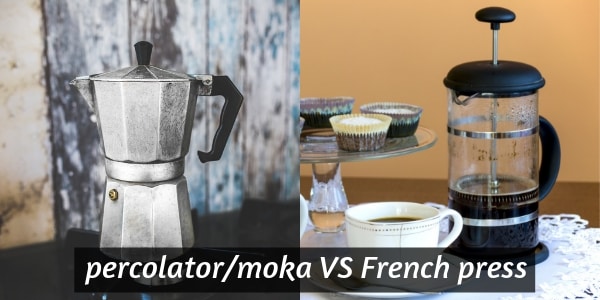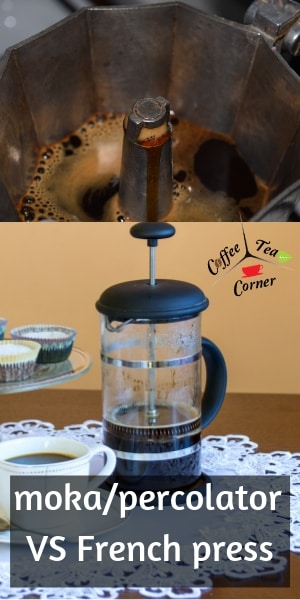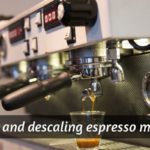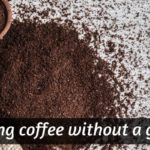When looking for a great brewing method, you're going to bump into the French pres and the percolator. Many people swear by them, and they both have their merits.
But what if we compared the French press vs the percolator ? Sure, there are clear differences, but sometimes a side by side comparison is what's needed.
So let's see their main differences, and how they can provide fresh, tasty coffee for you.

Table of Contents
1. Percolators provide more cups of coffee per batch
Percolators are very very different from french presses, even if they use almost the exact same coffee grind size. Because of the way percolators are made, they're usually very large and can serve many cups of coffee at a time.
You can note this by looking at the structure of a percolator. In the bottom half, there is a large chamber where you'll add the water. Above that, there is a filter which you will fill with as much coffee as you need.
And the top chamber, which screws onto the filter and bottom half is where the coffee collects. This chamber is as large as the water chamber, and as such can provide more cups of coffee.
Depending on your percolator and how large your cups are, it's not baffling to be able to serve 3 whole mugs of coffee at once. Again, different percolator sizes and different cup sizes.
A French press on the other hand is much more delicate. It's a smaller contraption, and a large part of it remains unused, so to speak. As in you cannot store the drinkable part of coffee, because that's occupied by the coffee grounds.
Trying to serve large amounts of coffee from a coffee press is not going to work, since you need space to push the plunger and brew the coffee. It can however serve 3-4 cups of coffee without a problem.
The quality of coffee of the percolator was compromised, in order to brew large batches of coffee.
2. French presses offer more complex cups of coffee
Given the way these two work, a French press will invariably offer a more nuanced, complex cup of coffee than a percolator. This is because the water stays in contact with the coffee grinds for much longer than with a percolator.
If anything, the percolator is reminiscent of an early espresso version in terms of mechanism. Oddly enough, it takes longer to brew than an espresso. More on that later.
Now let's focus on how the water touching the coffee. This is important because the amount of time water spends in contact with the coffee grinds is a key element in how much flavor is extracted.
There is the temperature of the water to deal with too, and the grind size, but we'll get to them as well.
For a French press the recommended amount of time to leave the grinds to steep is 4 minutes. Adjust according to however you want your coffee. Less time will result in a weaker coffee, more time will result in a more bitter coffee but not more caffeine.
So as long as you let the water do its thing, it will slowly extract the flavor and caffeine out of your coffee grind. Once you're done, push the plunger and you're ready to serve.
That plunger is also the filter, and the grinds will remain trapped at the bottom of your press. But the liquid will be thicker than a normal filter coffee, because the essential coffee oils and some very very fine grit will still make it out through that filter.
This gives the French press more body than the average cup of coffee, and a more nuanced taste.
A percolator does not offer this. It's not exactly adjustable, since its water is always at near-boiling point, and there's a short amount of time in which the coffee is in contact with water.
You can always stop the percolator early, yes. But the water still hasn't been in contact with the coffee nearly as much as a French press.
There is also the fact that you risk you coffee overflowing once the coffee at the top starts boiling. This is why it needs to be watched.
Check out my article about "How to make french press coffee"
3. French press coffee is on the thicker, grittier side
French press is going to be a thicker coffee, always. This is because the filter does work, but only in trapping the medium-size grind. This is why you need to use a larger size of coffee grounds.
Even so, a little bit of grit will still end up in your cup of coffee, along with some essential oils. This normally isn't a problem, given that these elements are what add more flavor to your coffee.
However there are people who would not like coffee grit at all in their cup, thank you very much. Well, for those people the percolator would do a better job.
In a percolator the coffee grounds never touch the upper chamber, and as such the only kind of coffee you get is 'clean' coffee. Unless you're using very powdery coffee grind (like for an espresso), in which case you should stop.
A very fine grind will actually make it through that filter in the percolator, and you won't be happy with the resulting sludge.
Some coffee brands state the kind of coffee machine that can take this or that kind of grind on their label. You can try and trust them, but remember that 'medium' can be many things for many companies.
4. Percolators tend to take longer than French presses
In terms of speed, I think percolators lose out a bit here. While the cup of coffee they produce is reliable, constant, and pretty much the same every time, it sometimes takes longer. Sometimes less.
It all has to do with the temperature of the water, and the grind size of your coffee.
You see, when you set up the percolator you need to provide the water in the lowest chamber, which will get how when you place it on the stove.
If you add cold water, it will take longer to boil. Add warm water, and it will take less time.
Conversely, adding smaller grind coffee will mean the coffee takes longer to make. The water will have a harder time going through the grounds and this means you coffee will come out slower.
A French press will always take 4 minutes. Of course, this is assuming you've already heated your water and set up the press. Add the coffee, add the hot water, let sit for 4 minutes, plunge, and you're done.
You can also decide how hot your water will be, since you have to boil it beforehand. A percolator does that for you, but it can only deliver near-boiling water, much like the famous whistling kettles.
(If you like this article so far, you can pin it to your Pinterest board by clicking the image below. The article continues after the image.)
5. A percolator must be watched over
When you prepare coffee vie percolator, you will need to be very careful when you take it off the heat. This is because it can overflow, and it's not an easy job to clean.
This goes for the Turkish ibric as well. But I digress.
The percolator will need you to keep an eye on it, so that it ends up alright. This does not happen with a French press, which for some people sounds like a godsend.
All you have to do is let it stand for 4 minutes, and it's done. That's plenty of time to wash your face and brush your teeth in the morning.
Given how differently these two methods are, it's no wonder they behave very differently. So don't push aside the percolator just because it needs a little watching over.
You get the hang of it very fast, and you can always peek at the top half to see where things are.
6. A French press is a bit easier to use
In terms of ease of use, I think the French press wins here. Especially for people who are not very good with details, and would do better with very simple, straightforward tasks.
Anyone can boil water, and them let a French press stand for a certain amount of time.
If I were to try and teach my dear granny to use a percolator, she'd probably get very frustrated by the timing thing. A French press would be easier on her.
I use my dear grandma as an example for the general populace. If my grandma can do it, pretty much anyone can do it.
A large part of the ease of a French press is the fact that it removes many of the steps from you. There is very little you need to actively do to it, in order to get a good cup of coffee.
A percolator requires some skills, and quick reflexes as well. And the screwing mechanism's always given me headaches, so I might be biased.
7. The French press can take a light roast
As for the roast type, I think the percolator would be a poor choice for a light roast. It simply can't give you the full bouquet of fruit and honey or floral notes of a lightly roasted coffee.
This is because the water is always way too hot with this machine. And lightly roasted coffee, delicate as it is, needs a lower temperature coffee.
This means that the percolator would pretty much scald the coffee and you'd end up with a very sour and unhappy cup of coffee, tasting much like some key parts are missing.
A French press will give you the option to brew with a light roast if you wish. This is because you decide how hot your water is, and you can always just use a lower temperature.
It will work well enough with any kind of roast type, from light to dark.
Do keep in mind that the darker the roast, the less notes you'll taste in your coffee. Nutty and earthy tones will come forward, as will chocolate and possibly caramel in some coffees.
For lighter roasts the fruity, floral, tangy notes in coffee will come forward. It will taste lighter on the whole, and it's not going to be as dark a brew as a dark roast.
The sweet spot if a medium, possibly a few degrees more or less depending on what type of bean you're using.
Grind size matters for both methods, and it's the same
Grind size will determine the quality of your coffee. If you use too large a grind size for either the percolator or the French press, you'll get an underextracted coffee.
This means your coffee grounds still had some aroma in them, but they hadn't released all of it when you served the coffee.
If you were to use smaller grind coffee, you'd end up with overextracted coffee. This tends to be very bitter, and an overly strong cup of coffee.
This is why using medium sized grinds are the best idea with percolators and French presses. Maybe a tad bit smaller for the percolator, so the water has a bit more coffee to extract before it goes in the upped chamber.
Choosing a good percolator will make brewing lots of coffee easy
A good percolator will brew your coffee beautifully, the same way every time. This also means that you're going to have it for a very long time, since this kind of design is going to last.
You need to make sure all the parts screw in well, and there are no leaks.
It's important to choose a good percolator, also called a Moka pot by the way, so your morning cup doesn't suffer. For example this one is made by a famous Italian brand, and it seems to be very much loved by those who have used it.
This particular one will brew you 2 cups of espresso, with a little left over. Of course, there are several sizes to choose from, including one that can make up to 12 cups of coffee at a time.
But if you're just looking for a morning cup, then this smaller one will do just fine.
You can check the listing on Amazon here, and read the reviews as well.
Choosing a good French press will get you flavorful cups of coffee
Choosing a good French press will mean you get a very delicate cup of coffee every time you brew a batch. Now, given how different the press is from the percolator you can't expect similar results.
For example this French press can contain 34 ounces of liquid (one liter), however you should keep in mind that a small portion of that will be coffee grounds, and not actual drinkable liquid.
The handle and support parts of this press are sturdy enough, and they're metal, which means they will conduct heat well enough and be sturdy enough when you lift the entire thing.
The instructions are easy enough to follow, and you're bound to produce a good cup of coffee (or several) with this kind of press. Do expect some resistance when pushing down the plunger, since this a slower process.
You can find the listing on Amazon here, and read the reviews as well.
Final thoughts
I hope you found yourself the answer for the best kind of coffee brewing method for you. I know the percolator is a very, very popular method and it was once the main way to make coffee.
Likewise, the French press has remained the same since the beginning of coffee.
Both provide fresh, hot coffee. One will give you a very strong, more bitter cup of coffee that will stand up to cream and sugar and still shine through.
The French press offers a more delicate profile, and you'll find more depth in this type of coffee.
Still, when you've got a whole bunch of guests to serve, you'll need to decide between a large batch of okay coffee, or several small batches of great coffee.
I for one would go with the French press, since I think it provides a more rounded, flavorful cup. You do you.
If you want to know more about coffee or tea, feel free to check the related articles below. Who knows what else you might find ?







